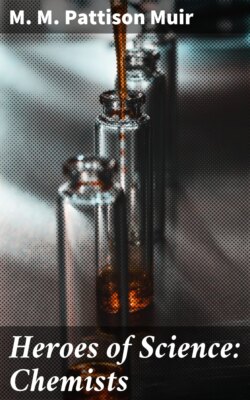Читать книгу Heroes of Science: Chemists - M. M. Pattison Muir - Страница 13
На сайте Литреса книга снята с продажи.
INTRODUCTORY.
ОглавлениеTable of Contents
As we trace the development of any branch of natural knowledge we find that there has been a gradual progress from vague and fanciful to accurate and definite views of Nature. We find that as man's conceptions of natural phenomena become more accurate they also for a time become more limited, but that this limitation is necessary in order that facts may be correctly classified, and so there may be laid the basis for generalizations which, being definite, shall also be capable of expansion.
At first Nature is strange; she is full of wonderful and fearful appearances. Man is overwhelmed by the sudden and apparently irregular outbreaks of storms, by the capricious freaks of thunder and lightning, by the awful and unannounced devastations of the volcano or the earthquake; he believes himself to be surrounded by an invisible array of beings more powerful than himself, but, like himself, changeable in their moods and easily provoked to anger. After a time he begins to find that it is possible to trace points of connection between some of the appearances which had so overpowered or perplexed him.
The huntsman observes that certain kinds of plants always grow where the game which he pursues is chiefly to be found; from the appearance of the sky at morning and evening the fisherman is able to tell whether there will follow weather suitable for him to set out in his fishing-boat; the tiller of the ground begins to feel sure that if he sow the seed in the well-dug soil and water it in proper seasons he will certainly reap the harvest in due time. And thus man comes to believe that natural events follow each other in a fixed order; there arises a conscious reference on his part of certain effects to certain definite causes. Accurate knowledge has begun.
As knowledge of natural appearances advances there comes a time when men devote themselves chiefly to a careful study of some one class of facts; they try to consider that part of Nature with which they are mostly concerned as separate from all other parts of Nature. Thus the various branches of natural knowledge begin to have each a distinct existence. These branches get more and more subdivided, each division is more accurately studied, and so a great number of facts is accumulated in many classes. Then we usually find that a master mind arises, who shows the connection which exists between the different parts of each division of natural knowledge, who takes a wide, far-reaching view of the whole range of the province of knowledge which he studies, and who, at the same time, is able to hold in his vision all the important details of each branch of which that province is composed.
And thus we again get wide views of Nature. But these are very different from the vague, dim and hesitating notions in which natural knowledge had its beginnings. In this later time men see that Nature is both simple and complex; that she is more wonderful than their fathers dreamed, but that through all the complexity there runs a definite purpose; that the apparently separate facts are bound together by definite laws, and that to discover this purpose and these laws is possible for man.
As we trace this progress in the various branches of natural knowledge we are struck with the fact that each important advance is generally accomplished by one or two leading men; we find that it becomes possible to group the history of each period round a few central figures; and we also learn that the character of the work done by each of these men of note is dependent on the nature and training of the individual man.
It will be my endeavour in the following pages to give an account of the advance of chemical science, grouping the facts in each stage of progress round the figures of one or two men who were prominent in that period.
For the purposes of this book it will be necessary that I should sketch only the most important periods in the story of chemical progress, and that in each of these I should fill in the prominent points alone.
I shall therefore select three periods in the progress of this science, and try to give an account of the main work done in each of these. And the periods will be:—
I. The period wherein, chiefly by the work of Black, Priestley and Lavoisier, the aim of chemical science was defined and the essential characters of the phenomena to be studied were clearly stated.
II. The period during which, chiefly by the labours of Dalton, Berzelius and Davy, the great central propositions of the science were laid down and were developed into a definite theory. As belonging in great extent to this period, although chronologically later, I shall also consider the work of Graham.
III. The period when, chiefly owing to advances made in organic chemistry, broader and more far-reaching systems of classification were introduced, and the propositions laid down in the preceding period were modified and strengthened. The workers in this period were very numerous; I shall chiefly consider these two—Liebig and Dumas.
I shall conclude with a brief sketch of some of the important advances of chemical science in more recent times, and a summary of the characteristics of each of the three periods.
